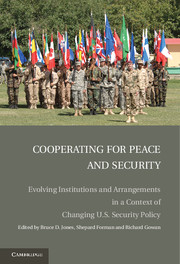 Cooperating for Peace and Security
Cooperating for Peace and Security Book contents
- Frontmatter
- Contents
- Contributors
- Foreword
- Acknowledgments
- I FRAMEWORK
- II ADAPTING COLD WAR INSTITUTIONS
- III NEW TOOLS, NEW MECHANISMS
- 10 Normative Evolution at the UN: Impact on Operational Activities
- 11 Constructing Sovereignty for Security
- 12 New Arrangements for Peace Negotiation
- 13 International Humanitarian Cooperation: Aiding War's Victims in a Shifting Strategic Environment
- 14 The Evolution of Regional and Subregional Collective Security Mechanisms in Post–Cold War Africa
- 15 International Courts and Tribunals
- IV CONCLUSIONS
- Index
- References
13 - International Humanitarian Cooperation: Aiding War's Victims in a Shifting Strategic Environment
Published online by Cambridge University Press: 22 January 2010
- Frontmatter
- Contents
- Contributors
- Foreword
- Acknowledgments
- I FRAMEWORK
- II ADAPTING COLD WAR INSTITUTIONS
- III NEW TOOLS, NEW MECHANISMS
- 10 Normative Evolution at the UN: Impact on Operational Activities
- 11 Constructing Sovereignty for Security
- 12 New Arrangements for Peace Negotiation
- 13 International Humanitarian Cooperation: Aiding War's Victims in a Shifting Strategic Environment
- 14 The Evolution of Regional and Subregional Collective Security Mechanisms in Post–Cold War Africa
- 15 International Courts and Tribunals
- IV CONCLUSIONS
- Index
- References
Summary
The act of extending aid to foreign peoples in crisis may be as old as the nation-state system itself. The cooperative institutions of international humanitarian aid are young, however, and they comprise a relatively new sphere of international cooperation. The current network of state and nonstate entities that allows for the large-scale delivery of relief aid came into being less than two decades ago.
This chapter explores the evolving institutions of the international humanitarian system as they relate to the shifting security landscape and U.S. political priorities. Overwhelmingly the world's largest humanitarian donor, the United States has in effect always carried, but at no time led, the international system for humanitarian response. Its engagement over the years is characterized by a steady permissiveness, and a tendency to observe and follow trends rather than drive institutional and policy change. At the same time, a leadership mantle in humanitarian institution building has been taken up by Great Britain, which seems to have found a niche in this issue-area to promote a values-based agenda and advance its policy goals in the developing world. As put forward in this chapter, impartial humanitarian assistance may in fact depend on the United States keeping to its more modest role.
The modern history of international humanitarian action includes a post–Cold War boom and crisis, followed by early reform and institution building; and later a second phase of reform that took on a United Nations (UN)-centric emphasis on strategic coherence for peacekeeping and peacebuilding objectives.
- Type
- Chapter
- Information
- Cooperating for Peace and SecurityEvolving Institutions and Arrangements in a Context of Changing U.S. Security Policy, pp. 247 - 268Publisher: Cambridge University PressPrint publication year: 2009


